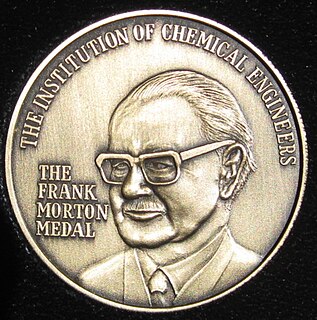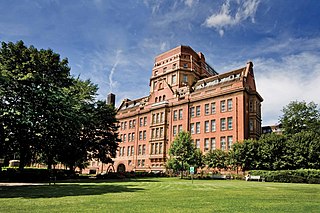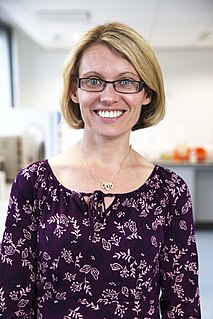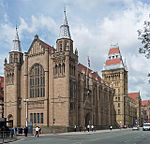
The University of Manchester Institute of Science and Technology (UMIST) was a university based in the centre of the city of Manchester in England. It specialised in technical and scientific subjects and was a major centre for research. On 1 October 2004, it amalgamated with the Victoria University of Manchester to produce a new entity called the University of Manchester.

The University of Manchester is a public research university in Manchester, England. The main campus is south of Manchester City Centre on Oxford Road. The university owns and operates major cultural assets such as the Manchester Museum, Whitworth Art Gallery, John Rylands Library and Jodrell Bank Observatory—a UNESCO World Heritage Site.

The Department of Computer Science at the University of Manchester is the longest established department of Computer Science in the United Kingdom and one of the largest. It is located in the Kilburn building on the Oxford Road and currently has over 800 students taking a wide range of undergraduate and postgraduate courses and 60 full-time academic staff.

Alliance Manchester Business School is the business school of the University of Manchester in Manchester, England. One of the most prestigious business schools in the United Kingdom, it is also the second oldest in the UK, and provides education to undergraduates, postgraduates and executives.

The Department of Mathematics at the University of Manchester is one of the largest unified mathematics departments in the United Kingdom, with over 90 academic staff and an undergraduate intake of roughly 400 students per year and approximately 200 postgraduate students in total. The School of Mathematics was formed in 2004 by the merger of the mathematics departments of University of Manchester Institute of Science and Technology (UMIST) and the Victoria University of Manchester (VUM). In July 2007 the department moved from the Mathematics Tower into a purpose-designed building─the first three floors of the Alan Turing Building─on Upper Brook Street. In a Faculty restructure in 2019 the School of Mathematics reverted to the Department of Mathematics. It is one of five Departments that make up the School of Natural Sciences, which together with the School of Engineering now constitutes the Faculty of Science and Engineering at Manchester.

George Edward Davis (1850–1907) is regarded as the founding father of the discipline of chemical engineering.

Frank Morton MScTech, PhD, AMCT, DSc, FRIC, was a noted professor of chemical engineering, instrumental in the creation of UMIST and commemorated by Frank Morton Sports Day and a medal named after him.

The Department of Materials, at the University of Manchester is an academic and research department specialising in Materials Science and Engineering and Fashion Business and Technology. It is the largest materials science and engineering department in Europe. This is reflected by an annual research income of around £7m, 60 academic staff, and a population of 150 research students and 60 postdoctoral research staff. The Department of Materials was formerly known as the School of Materials until a faculty-wide restructuring in 2019.
The Faculty of Science and Engineering (FSE) is one of the three faculties that comprise the University of Manchester in northern England. Established in October 2004, the faculty was originally called the Faculty of Engineering and Physical Sciences. It was renamed in 2016, following the abolition of the Faculty of Life Science and the incorporation of some aspects of life sciences into the departments of Chemistry and Earth and Environmental Sciences. It is organised into 2 schools and 9 departments: Chemical Engineering and Analytical Science; Chemistry; Computer Science; Earth and Environmental Sciences; Physics and Astronomy; Electrical & Electronic Engineering; Materials; Mathematics; and Mechanical, Aerospace and Civil Engineering.
The School of Biological Sciences is a School within the Faculty Biology, Medicine and Health at The University of Manchester. Biology at University of Manchester and its precursor institutions has gone through a number of reorganizations, the latest of which was the change from a Faculty of Life Sciences to the current School.
The Department of Mechanical, Aerospace & Civil Engineering at the University of Manchester was formed from three departments in the 2004 merger between the Victoria University of Manchester (VUM) and the University of Manchester Institute of Science and Technology (UMIST). The merged departments were the Department of Civil and Construction Engineering which was joint between both universities, the Department of Mechanical Aerospace and Manufacturing Engineering at UMIST and the Manchester School of Engineering at VUM.

The Sackville Street Building is a building on Sackville Street, Manchester, England. The University of Manchester occupies the building which, before the merger with UMIST in 2004, was UMIST's "Main Building". Construction of the building for the Manchester School of Technology began in 1895 on a site formerly occupied by Sir Joseph Whitworth's engineering works; it was opened in 1902 by the then Prime Minister, Arthur Balfour. The School of Technology became the Manchester Municipal College of Technology in 1918.
The UCL Faculty of Engineering Sciences is one of the 11 constituent faculties of University College London (UCL). The Faculty, the UCL Faculty of Mathematical and Physical Sciences and the UCL Faculty of the Built Envirornment together form the UCL School of the Built Environment, Engineering and Mathematical and Physical Sciences.
Professor Bodo Linnhoff is a chemical engineer and academic who developed Pinch Analysis, a methodology for minimising energy usage in the process industries. In its early days, the technique helped companies such as ICI and BASF to design plants that used roughly 30% less energy. As of the 1990s, Pinch Analysis became industrial standard in the oil refining and petrochemical industries. In 2010, Linnhoff founded a finance company, Harvester International, which nurtures innovation and guides smaller companies, such as Inview Technology.

The Department of Electrical and Electronic Engineering (EEE) at the University of Manchester was formed at the merger of the Victoria University of Manchester and UMIST in 2005, formed largely from the former UMIST department of the same name. The department has its origins in the Department of Physics and Electrical Engineering in the Manchester Municipal School of Technology. The department was originally known as the School of Electrical and Electronic Engineering following the formation of the University of Manchester, however it was renamed in 2019 following a faculty-wide restructuring.
Professor John Garside is a British chemical engineer who was the last Vice-Chancellor of UMIST.

Aline Fiona Miller is a Professor of Biomolecular Engineering at the University of Manchester. She specialises in the characterisation of polymer, biopolymer and peptides, using neutron and x-ray scattering, as well as the development of functionalised nanostructures for regenerative medicine and toxicology testing.
Robert (Bob) Kennedy is an American chemist specializing in bioanalytical chemistry including liquid chromatography, capillary electrophoresis, and microfluidics. He is currently the Hobart H. Willard Distinguished University Professor of Chemistry and the Chair of the Department of Chemistry at the University of Michigan. He holds joint appointments with the Department of Pharmacology and Department Macromolecular Science and Engineering. Kennedy is an Associate Editor of Analytical Chemistry.
Majid Amidpour is a professor of Mechanical and Energy engineering at Khajeh Nasir Toosi University of Technology (KNTU). He is also the director of the Energy and Environment Research Center at Niroo Research Institute (NRI), Tehran, Iran.
Graham Charles Wood FRS was an English corrosion scientist.










